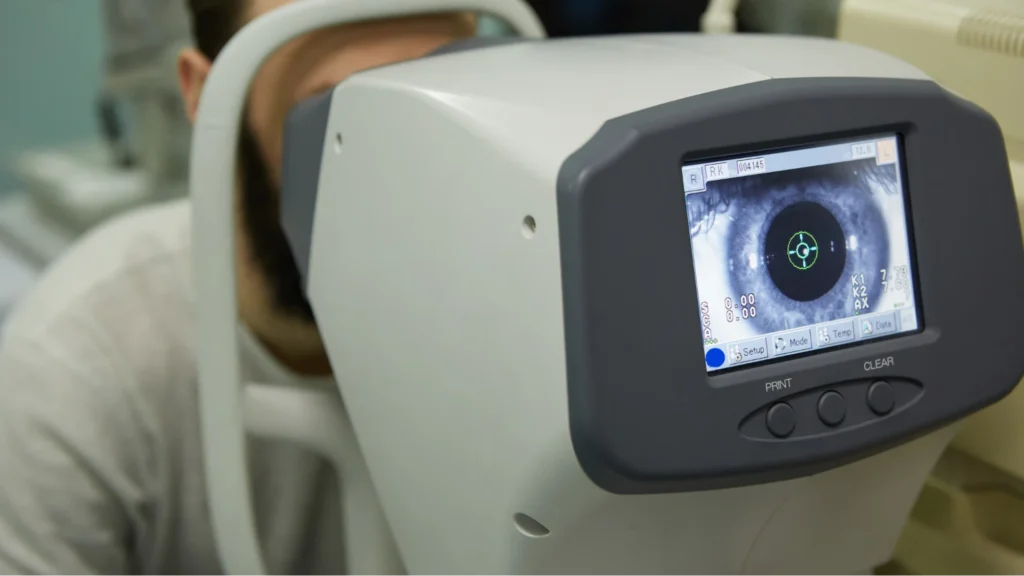You’re squinting at your computer screen again, wondering if it’s time for that eye exam you’ve been putting off. Maybe your kid came home from school saying they can’t see the board clearly, or perhaps you’ve noticed your vision isn’t quite what it used to be. Now you’re faced with a common question that stumps many people: Should you see an ophthalmologist or an optometrist?
Don’t worry – you’re not alone in this confusion. Many folks find themselves scratching their heads when trying to figure out which eye care professional is right for them. The good news is that by the end of this post, you’ll have a clear understanding of what each specialist does, when to see whom, and how to make the best choice for your eye care needs.
We’ll walk through the key differences between these eye care professionals, explore what services each provides, and help you determine the right path forward – whether you’re dealing with routine vision needs, managing a chronic condition like diabetes, or facing more complex eye health issues.
Understanding the Basics: What’s the Difference?
Let’s start with the fundamentals. Both ophthalmologists and optometrists are eye care specialists, but they have different levels of training and handle different types of eye problems.
- Optometrists are healthcare professionals who’ve completed four years of optometry school after their undergraduate degree. Think of them as your primary eye care providers, and the ones you’ll likely see for routine eye exams, contact lens prescriptions, and eyeglasses prescription needs. They can also diagnose and treat many common eye conditions.
- Ophthalmologists, on the other hand, are medical doctors who’ve completed medical school, followed by a specialized residency in eye and vision care. They can perform surgery, treat complex eye diseases, and handle medical conditions that affect your eyes.
Here’s a simple way to think about it: if your eyes were cars, optometrists would be like skilled mechanics who handle regular maintenance, tune-ups, and common repairs. Ophthalmologists would be the specialized technicians you’d call for major engine work or complex problems.
What Can an Optometrist Do for You?
Your local optometrist is often your first stop for eye care, and for good reason. They’re equipped to handle a wide range of vision and eye health needs that most people encounter.
Routine eye exams and vision correction
Optometrists excel at comprehensive eye exams that check your vision sharpness, eye coordination, and overall eye health. They’ll test for common refractive errors like nearsightedness, farsightedness, and astigmatism. If you need vision correction options, they can prescribe and fit contact lenses or recommend the right eyeglasses for your lifestyle.
Common eye condition management
Many eye conditions fall squarely within an optometrist’s wheelhouse. They can diagnose and treat dry eyes (a big problem for those of us staring at screens all day), minor eye infections, and certain types of glaucoma. They’re also great at spotting early signs of more serious conditions that might need specialized care.
Specialized services
Modern optometry practices like LMC Optometry & Eye Care often provide services that go beyond basic eye exams. Many optometrists can manage certain eye diseases, provide pre- and post-operative care for eye surgeries, and offer specialized treatments for conditions like digital eye strain and dry eye disease.
When You Need an Ophthalmologist
Sometimes your eye care needs require the advanced training and surgical expertise that only an ophthalmologist can provide. Here’s when you should consider making that appointment.
Surgical Procedures
Any time surgery is involved, you’re looking at ophthalmologist territory. This includes cataract surgery (one of the most common procedures), LASIK and other refractive surgeries, retinal repairs, and glaucoma surgeries. They have the medical training to handle both the procedure itself and any complications that might arise.
Complex Eye Disease Treatment
Certain eye conditions require the advanced medical knowledge that comes with an ophthalmologist’s training. These include severe forms of glaucoma, macular degeneration, diabetic retinopathy, and retinal detachments.
Serious Eye Injuries and Emergencies
When you’re dealing with significant eye trauma, chemical burns, or sudden vision loss, an ophthalmologist’s emergency care expertise becomes crucial. They can provide immediate surgical intervention when needed and coordinate with other medical specialists.
Making the Right Choice for Your Situation

Now that you understand what each professional does, let’s talk about how to choose the right one for your specific needs.
For Routine Care and General Vision Needs
If you’re due for your annual eye exam, need new glasses or contacts, or are dealing with minor eye irritation, an optometrist is usually your best bet. They’re typically easier to get appointments with, often more affordable, and perfectly qualified to handle these common needs.
Parents bringing their kids in for routine eye exams will find that optometrists are often great with children and can catch vision problems that might affect school performance. Many optometry practices are set up to be kid-friendly environments that help reduce anxiety around eye exams.
When You Have Chronic Health Conditions
If you have diabetes, high blood pressure, or other systemic health conditions that can affect your eyes, you might need care from both professionals. Your optometrist can handle routine monitoring and basic care, while an ophthalmologist provides specialized medical management when needed.
For Elective Procedures and Advanced Care
Thinking about LASIK or other vision correction surgery? You’ll need an ophthalmologist for the procedure itself, though your optometrist might provide some of the pre- and post-operative care. This collaborative approach often works well for patients.
Practical Considerations: Cost, Insurance, and Accessibility
Let’s talk about the practical stuff that affects your decision-making.
- Cost Factors: Generally speaking, optometrist visits tend to be less expensive than ophthalmologist appointments. If you’re paying out of pocket or have a high deductible, this can make a significant difference for routine care.
- Insurance Coverage: Most insurance plans in Ontario cover routine eye exams with optometrists, especially for children and seniors. Specialized services from ophthalmologists are usually covered when medically necessary, but elective procedures like LASIK typically aren’t covered by provincial health insurance.
- Wait Times and Accessibility: You can usually get an appointment with an optometrist much faster than with an ophthalmologist. If you’re dealing with non-urgent vision changes or need routine care, this accessibility advantage is significant.
Frequently Asked Questions
- Can an optometrist diagnose glaucoma?
Yes, optometrists can diagnose and monitor certain types of glaucoma. They’ll often work with ophthalmologists for surgical treatment or complex cases, but many forms of glaucoma can be managed effectively by your optometrist.
- How often should I see an eye care professional?
Most adults should have comprehensive eye exams every 1-2 years. If you’re over 60, have diabetes, or wear contacts, annual exams are usually recommended. Kids should have their first eye exam by age 3, then regularly throughout school.
- Will my family doctor refer me to the right eye specialist?
Your family doctor can refer you to either an optometrist or an ophthalmologist, but they might not always know which is most appropriate for your specific needs. Don’t hesitate to ask questions about why they’re recommending a particular specialist.
- Can optometrists prescribe medications?
Yes, optometrists in Ontario can prescribe certain medications for eye conditions like infections, dry eyes, and some types of glaucoma. However, ophthalmologists have broader prescribing privileges for complex eye diseases.
Making Your Decision
Choosing between an ophthalmologist and an optometrist doesn’t have to be complicated. Start by considering your immediate needs, any existing health conditions, and your budget constraints.
For most people, establishing a relationship with a good optometrist for routine care makes sense. They can handle your regular needs and refer you to specialists when necessary. It’s like having a family doctor for your eyes. Someone who knows your history and can coordinate your care.
If you’re dealing with a known serious eye condition, have diabetes, or are considering eye surgery, building a relationship with an ophthalmologist might be your priority.
Your Next Steps
Both optometrists and ophthalmologists play important roles in keeping your eyes healthy. The key is knowing when you need which type of care. For most routine needs, your optometrist is the perfect starting point, while ophthalmologists handle the complex medical and surgical cases.
Don’t let confusion keep you from getting the eye care you need. Your vision is too important to ignore.
Ready to schedule your comprehensive eye exam? Book your appointment at LMC Optometry & Eye Care today and take the first step toward better eye health.



